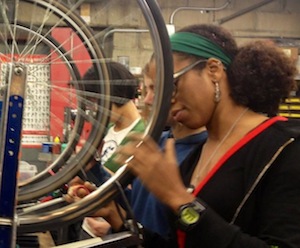Compared to the population at large, Latinas have high rates of diabetes and obesity, putting them at elevated risk of heart disease. At the same time, women are less likely than men to get around by bicycle. In an effort to integrate active transportation into the daily lives of Latina residents, community groups in Queens are organizing a new Spanish-language program to teach women bike repair and ride leadership skills. Corona Plaza and the Queens Museum will serve as focal points for the program, beginning in June.

The 12-week, two-part program, launched by WE Bike, Immigrant Movement International, and the Queens Museum, aims to train six leaders who can promote bicycling in the neighborhood. The first nine weeks will focus on bike mechanics and how to lead group rides, while the second phase will offer stipends to lead rides and events with other community members around the neighborhood, including at Flushing Meadows-Corona Park and Corona Plaza.
The plan for a Latina bicycling program in Corona began over drinks a few months ago. Elizabeth Jose started WE Bike last year, after an email to some friends and acquaintances snowballed into a series of rides and events for women. When she met Queens Museum employee Prerana Reddy at a happy hour, Jose began talking about her goals for WE Bike, including outreach to more women of color.
"I was intrigued," Reddy said, adding that the museum has dabbled in bike programs, like the Tour de Queens and DOT helmet giveaways. "It's something that we've done in small ways," she said, and she saw an opportunity to expand the museum's involvement.
But Reddy knew that she and Jose couldn't pull it off alone. To gauge interest from immigrant communities, they connected with Immigrant Movement International, which had worked with the Queens Museum before. The group, already running a health and fitness program for women in Corona, which features Zumba, tai chi, nutrition, and anti-domestic violence classes, asked participants if they would be interested in adding bicycling to the mix. They got a positive response. Group members were particularly interested in an earn-a-bike model, where participants get a new bicycle after learning maintenance and repair skills.
"We're not just coming in and doing this top-down project," Jose said. The group hosts meetings at IM International's office and relies on feedback to design the program. As summer nears, there will be an application process for participants, and the group is already working with Brooklyn Cruiser to acquire bicycles.
Although there are cultural and language barriers, organizers are confident they can be overcome by working with program participants. Most members of the planning team speak Spanish, but other obstacles remain. Many of the women they hope to involve are mothers, for instance, so organizers are figuring out a way to either involve children or provide childcare.
In a community where bicycling is an overwhelmingly male activity, the organizers are hopeful that the participants will be able to influence the perceptions -- and behavior -- of other Latinas.
"They don't necessarily see other women of color biking," Reddy said, adding that she hopes participants can become advocates for biking within their community.
The initiative was awarded a grant from the Fund for Public Health in New York, a partnership between business, philanthropies, and the city health department. The funds are from the Partnership for a Healthier New York City, created to administer a citywide grant from the Centers for Disease Control and Prevention.
Jose doesn't think the initiative will end when the grant runs out. "Hopefully we'll be able to grow the community again next year with a similar model," she said. "It's a model for where WE Bike can go in the future."





